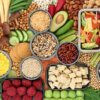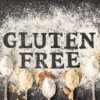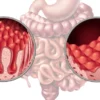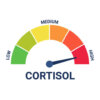
Ulcerative colitis is a type of disease that leads to inflammation in the large intestine. This is one of the two main forms of inflammatory bowel disease (IBD) the other being Crohn’s disease.
The inflammation along the gut lining seen in Ulcerative colitis can vary in severity and can appear at any point along the large bowel.
A key feature of Ulcerative colitis it presents as a relapsing and remitting disease. This is where symptoms reduce or disappear for a period of time. This can be followed by a flare-up where symptoms increase in severity. [Source: Pubmed]
How to stop or calm down Ulcerative colitis is an important part of it’s long-term management.
What are the symptoms of an Ulcerative colitis flare-up?
The main symptoms of an Ulcerative colitis flare-up include an increase in many digestive complaints.
These include:
- Bloody diarrhoea (this can be with or without mucus)
- Rectal urgency
- Abdominal pain that often improves after a bowel movement
The area of pain in the abdomen (tummy) can be related to the region of the intestine that is inflamed. This can lead to a range of foods becoming more problematic and increasing the sensation of pain and discomfort in the gut. These are generally higher fibre foods that can increase symptoms during an Ulcerative colitis flare which include nuts, seeds as well as some fruits and vegetables [Source: NHS]
Before a flare in ulcerative colitis, symptoms can be stable but then increase gradually over a period of time which often leads to a flare-up. [Source: Pubmed]
What causes a flare-up?
A 2016 study identified several factors that increase the risk of a flare-up.
These risk factors include:
- A younger age at the time of diagnosis
- The amount of the bowel that is impacted
- Multiple prior relapses
- Calprotectin of over 190ug/g on repeated tests.
Additionally, the use of NSAIDs (non-steroidal anti-inflammatory drugs) may also contribute to a relapse of symptoms. Due to their impact on the gut, the use of medications such as Ibuprofen may lead to a relapse in symptoms in approximately 20% of patients.
Emotional health has also been linked to relapse rates in Ulcerative colitis. Those with low-stress levels were least likely to experience an increase in Ulcerative colitis symptoms. This is understood to be due to the increase in stress hormones influencing the immune and inflammatory response in the gut. [Source: Pubmed]
Also Read: What Is Pancolitis? Symptoms, Causes & Treatment
Gut Bacteria and Ulcerative Colitis
Imbalances in the gut microbiome have been linked with the onset of IBD. This is likely due to an inappropriate immune response to the gut bacteria leading to inflammation.
It’s also been noted that in those with IBD, there are imbalances in the gut bacteria. This bacterial imbalance is referred to as dysbiosis and is seen as a reduction in the diversity of the gut bacteria. This also results in a reduced number of specific beneficial bacteria that have anti-inflammatory properties. [Source: Pubmed]

Can meditation help an Ulcerative colitis flare?
Levels of stress can influence the disease state and contribute to a flare in Ulcerative colitis. This has been shown to be due to a variety of factors which include the microbial balance of the gut as the immune response. [Source: Pubmed]
With this in mind, research has been carried out into relaxation practices such, Mindfulness-based Cognitive Therapy and meditation, to support the stress response and the gut-brain connection.
One study reported a significant reduction in markers of inflammation and stress levels. This was shown as a reduction in faecal calprotectin and c-reactive protein as well as reduced levels of the stress hormone cortisol [Source: Pubmed]
A second study reported improvements in emotional markers such as levels of anxiety and depression as well as an overall improvement in quality of life [Source: Pubmed]
Also Read: Foods To Avoid With Ulcerative Colitis
How long do Ulcerative colitis flare-ups last?
The duration of Ulcerative colitis flare-ups can vary from person to person. It is normal for symptoms, such as diarrhoea, bloating and pain, to go up and down during a flare-up.
How long the flare-up lasts can vary on factors such as medications, stress levels, food intake as well as how severe the disease is.
How to stop Ulcerative colitis bleeding?
During an ulcerative colitis flare-up, one of the most common and most concerning symptoms is increased blood when passing a stool. This can often come with increased mucus production.
Due to the irritation and inflammation along the gut lining, reducing the fibre content of the food can be helpful. This can reduce irritation along the gut.
When preparing food it may be helpful to remove stems and skins from fruits and vegetables as well as ensure these are well cooked and perhaps pureed to a smooth texture. Other high-fibre foods such as popcorn as well as nuts and seeds may also be limited to reduce the irritation along the gut wall. [Source: Pubmed]
Probiotic for Ulcerative colitis flare-up?
Probiotic supplements have been shown to help maintain longer periods of remission and also reduce the risk of a flare-up.
A probiotic supplement was prescribed to Ulcerative colitis patients who were not responding to conventional medical approaches. This led to a remission/response rate of 77% of the patients prescribed the probiotic with no adverse reactions reported. [Source: Pubmed]
Pain relief for Ulcerative colitis flare-up
While the long-term remission of Ulcerative colitis is the aim, short-term pain relief to help manage an Ulcerative colitis flare is important.
NSAIDs, such as aspirin, ibuprofen, and naproxen can impact the gut lining in a way that may worsen the symptoms of Ulcerative colitis.
This is the reason why Acetaminophen/Paracetamol are often recommended in Ulcerative colitis. [Source: Pubmed]
Can I drink alcohol with an ulcerative colitis flare-up?
Alcohol has a significant impact on the gut microbiome, leading to changes that can promote inflammation. While a small amount may be well tolerated, for some, alcohol even when consumed in small amounts, can lead to an increase in symptoms such as diarrhoea and pain.
The changes in the gut microbiome are noted in Ulcerative colitis patients who consume alcohol. Specifically, an increased number of bacteria that promote inflammation in the gut. This may then lead to increased permeability along the gut lining (leaky gut) and the overactivation of the immune response which then leads to the tissue damage seen in this condition. [Source: Pubmed]
What to eat with an ulcerative colitis flare-up?
While certain foods can be very well tolerated during good periods of the disease, these may then become an issue during an Ulcerative colitis flare-up.
Once the gut lining becomes inflamed and irritated this can lead to anything passing along it feeling very painful. This leads to the suggestions to reduce foods rich in fibre which can take a strain off the gut.
This involves key points such as:
- Removing stems and skins from fruits and vegetables
- Cooking and pureeing fruits as vegetables
- Slow cooking meats
- Avoiding nuts and seeds
Dairy has also been indicated to be an issue for many people with Ulcerative colitis and can potentially contribute to a flare. Removing dairy may calm the immune response and flare-up. A 2014 study concluded that the intake of dairy products may increase the severity of Ulcerative colitis. [Source: Pubmed]
Conclusion
Flare-ups in this condition can be painful and unpredictable. Rather than a single factor stopping a flare-up a combination of all areas listed above can often be the quickest way to calm symptoms.
Over the longer term, more in-depth dietary and supplement approaches can also be considered to address the imbalances in the gut and the immune response.
This is with the aim of keeping symptoms in remission and avoiding flare-ups of any kind.






